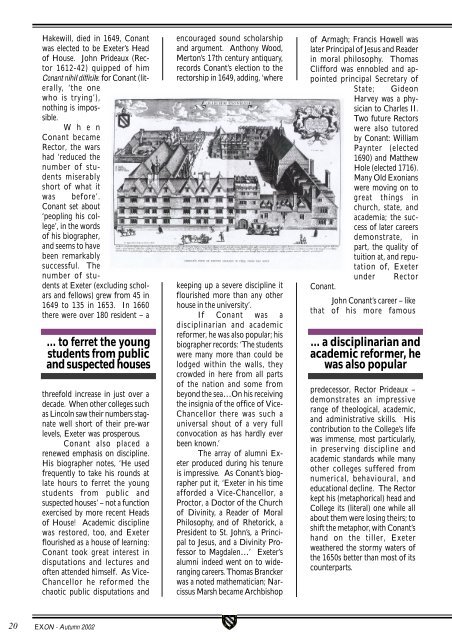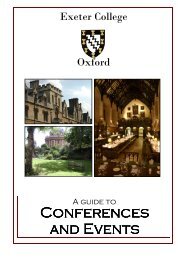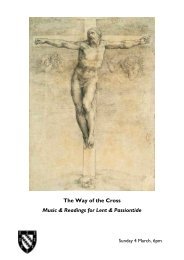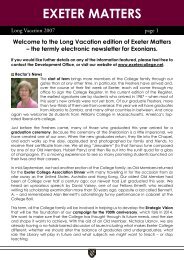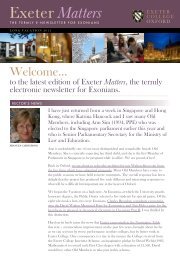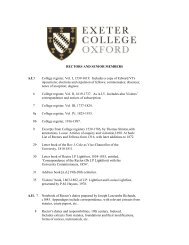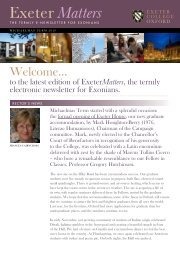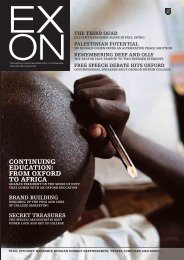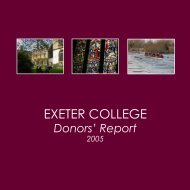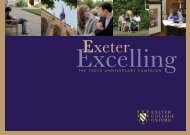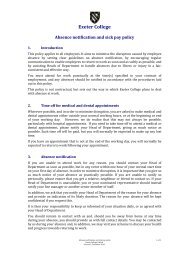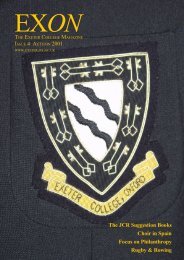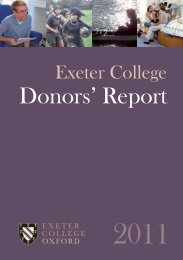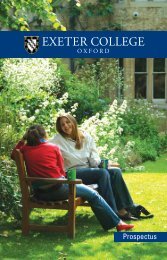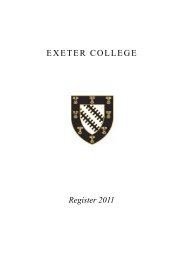2002 - Exeter College - University of Oxford
2002 - Exeter College - University of Oxford
2002 - Exeter College - University of Oxford
You also want an ePaper? Increase the reach of your titles
YUMPU automatically turns print PDFs into web optimized ePapers that Google loves.
Hakewill, died in 1649, Conant<br />
was elected to be <strong>Exeter</strong>’s Head<br />
<strong>of</strong> House. John Prideaux (Rector<br />
1612-42) quipped <strong>of</strong> him<br />
Conant nihil difficile: for Conant (literally,<br />
‘the one<br />
who is trying’),<br />
nothing is impossible.<br />
W h e n<br />
Conant became<br />
Rector, the wars<br />
had ‘reduced the<br />
number <strong>of</strong> students<br />
miserably<br />
short <strong>of</strong> what it<br />
was before’.<br />
Conant set about<br />
‘peopling his college’,<br />
in the words<br />
<strong>of</strong> his biographer,<br />
and seems to have<br />
been remarkably<br />
successful. The<br />
number <strong>of</strong> students<br />
at <strong>Exeter</strong> (excluding scholars<br />
and fellows) grew from 45 in<br />
1649 to 135 in 1653. In 1660<br />
there were over 180 resident – a<br />
... to ferret the young<br />
students from public<br />
and suspected houses<br />
threefold increase in just over a<br />
decade. When other colleges such<br />
as Lincoln saw their numbers stagnate<br />
well short <strong>of</strong> their pre-war<br />
levels, <strong>Exeter</strong> was prosperous.<br />
Conant also placed a<br />
renewed emphasis on discipline.<br />
His biographer notes, ‘He used<br />
frequently to take his rounds at<br />
late hours to ferret the young<br />
students from public and<br />
suspected houses’ – not a function<br />
exercised by more recent Heads<br />
<strong>of</strong> House! Academic discipline<br />
was restored, too, and <strong>Exeter</strong><br />
flourished as a house <strong>of</strong> learning:<br />
Conant took great interest in<br />
disputations and lectures and<br />
<strong>of</strong>ten attended himself. As Vice-<br />
Chancellor he reformed the<br />
chaotic public disputations and<br />
encouraged sound scholarship<br />
and argument. Anthony Wood,<br />
Merton’s 17th century antiquary,<br />
records Conant’s election to the<br />
rectorship in 1649, adding, ‘where<br />
keeping up a severe discipline it<br />
flourished more than any other<br />
house in the university’.<br />
If Conant was a<br />
disciplinarian and academic<br />
reformer, he was also popular; his<br />
biographer records: ‘The students<br />
were many more than could be<br />
lodged within the walls, they<br />
crowded in here from all parts<br />
<strong>of</strong> the nation and some from<br />
beyond the sea…On his receiving<br />
the insignia <strong>of</strong> the <strong>of</strong>fice <strong>of</strong> Vice-<br />
Chancellor there was such a<br />
universal shout <strong>of</strong> a very full<br />
convocation as has hardly ever<br />
been known.’<br />
The array <strong>of</strong> alumni <strong>Exeter</strong><br />
produced during his tenure<br />
is impressive. As Conant’s biographer<br />
put it, ‘<strong>Exeter</strong> in his time<br />
afforded a Vice-Chancellor, a<br />
Proctor, a Doctor <strong>of</strong> the Church<br />
<strong>of</strong> Divinity, a Reader <strong>of</strong> Moral<br />
Philosophy, and <strong>of</strong> Rhetorick, a<br />
President to St. John’s, a Principal<br />
to Jesus, and a Divinity Pr<strong>of</strong>essor<br />
to Magdalen…’ <strong>Exeter</strong>’s<br />
alumni indeed went on to wideranging<br />
careers. Thomas Brancker<br />
was a noted mathematician; Narcissus<br />
Marsh became Archbishop<br />
<strong>of</strong> Armagh; Francis Howell was<br />
later Principal <strong>of</strong> Jesus and Reader<br />
in moral philosophy. Thomas<br />
Clifford was ennobled and appointed<br />
principal Secretary <strong>of</strong><br />
State; Gideon<br />
Harvey was a physician<br />
to Charles II.<br />
Two future Rectors<br />
were also tutored<br />
by Conant: William<br />
Paynter (elected<br />
1690) and Matthew<br />
Hole (elected 1716).<br />
Many Old Exonians<br />
were moving on to<br />
great things in<br />
church, state, and<br />
academia; the success<br />
<strong>of</strong> later careers<br />
Conant.<br />
demonstrate, in<br />
part, the quality <strong>of</strong><br />
tuition at, and reputation<br />
<strong>of</strong>, <strong>Exeter</strong><br />
under Rector<br />
John Conant’s career – like<br />
that <strong>of</strong> his more famous<br />
... a disciplinarian and<br />
academic reformer, he<br />
was also popular<br />
predecessor, Rector Prideaux –<br />
demonstrates an impressive<br />
range <strong>of</strong> theological, academic,<br />
and administrative skills. His<br />
contribution to the <strong>College</strong>’s life<br />
was immense, most particularly,<br />
in preserving discipline and<br />
academic standards while many<br />
other colleges suffered from<br />
numerical, behavioural, and<br />
educational decline. The Rector<br />
kept his (metaphorical) head and<br />
<strong>College</strong> its (literal) one while all<br />
about them were losing theirs; to<br />
shift the metaphor, with Conant’s<br />
hand on the tiller, <strong>Exeter</strong><br />
weathered the stormy waters <strong>of</strong><br />
the 1650s better than most <strong>of</strong> its<br />
counterparts.<br />
20 EXON - Autumn <strong>2002</strong>


